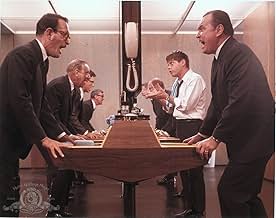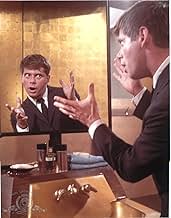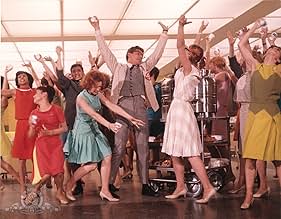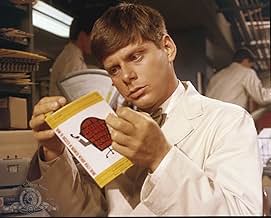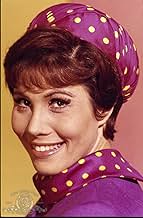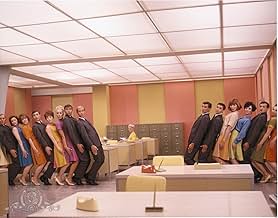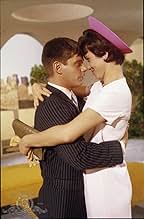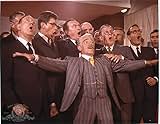Wie man Erfolg hat, ohne sich besonders anzustrengen
Originaltitel: How to Succeed in Business Without Really Trying
IMDb-BEWERTUNG
7,2/10
5423
IHRE BEWERTUNG
Füge eine Handlung in deiner Sprache hinzuArmed with the titular manual, an ambitious window washer seeks to climb the corporate ladder.Armed with the titular manual, an ambitious window washer seeks to climb the corporate ladder.Armed with the titular manual, an ambitious window washer seeks to climb the corporate ladder.
- Auszeichnungen
- 2 Nominierungen insgesamt
Anthony 'Scooter' Teague
- Bud Frump
- (as Anthony Teague)
Kathryn Reynolds
- Miss Smith aka Smitty
- (as Kay Reynolds)
Jeff DeBenning
- Gatch
- (as Jeff Debenning)
Empfohlene Bewertungen
One of the great satirical, musical comedies of the 60s. Robert Morse in the lead role is not unlike a sophisticated version of one of the Jerry Lewis characters of the same era - with the exception that he sings. And, he sings some wonderfully witty songs that must be very close to the bone in companies that take themselves too seriously. Sammy Smith is superb in his dual roles as the quarter of a century mail room head who "plays it the company way" and then later as Chairman Wally, the ex window washer. The lyrics will never date, along with the hammy caricatures of the self serving executives and staff. Not all stage musicals have translated well to the screen but How to Succeed is a noteworthy exception - highly recommended.
Except for four songs being dropped and a slight altering of the original story's pacing, this is a flawless translation of a Broadway classic to the big screen, making great use of New York locations and retaining Robert Morse in the best role of his entire career as the ambitious window washer J. Pierrepoint Finch who climbs his way up the corporate ladder by every little trick in a book that the musical takes it's title from. Morse's timing and delivery is perfect and everyone who's played the part of Finch since on Broadway (most notably Matthew Broderick a few years back) have had to emulate his basic approach to the part.
Michele Lee is also perfect as the secretary Rosemary who is madly in love with Finch. Her sexy solo of "I Believe In You" (a vast improvement over the stage's "Happy To Keep His Dinner Warm") makes you wish she hadn't given up Broadway for TV success because she has one of the best singing voices you'll ever hear.
Michele Lee is also perfect as the secretary Rosemary who is madly in love with Finch. Her sexy solo of "I Believe In You" (a vast improvement over the stage's "Happy To Keep His Dinner Warm") makes you wish she hadn't given up Broadway for TV success because she has one of the best singing voices you'll ever hear.
I saw this movie on a local PBS station for the first time since it originally came out in the movies. I was only 10 at the time so I didn't get it and I remember not being crazy about it. ALthough the song "I believe in you" was a favorite of mine. I actually looked at the TV schedule to see what else was on. And I vowed to change the channel at 12, the coming hour. But a funny thing happened, I forgot about the other movie and I remained glued to the screen and saw it to the end. The movie is about a window washer who pledges to become a CEO within a short time by reading a "How To Book", hence the title. How delightful to see Michelle Lee singing..what a voice. I didn't remember her singing I Believe in You. Then we have Robert Morse. I was never a big fan of the slap stick comedy ala Jim Carrey Chevy Chase and Robin Wiliams. Robert Morse could give them all a few lessons on playing broad comedy without going over board. Rudy Vallee and the man who played Big Deal in West Side Story (one of my favorite musicals) were hilarious. He was the nephew of the CEO Vallee so we all know what type of character he was playing. We also have the CEO's bimbo girlfriend who wants to get out of the Secretary pool. She actually is not as dumb as we are suppose to think she is. It was a very upbeat funny movie. And for some reason I believe a lot of people in the business world probably know even less then the Robert Morse character, a window washer Maybe they should read the same type of book he was reading. This musical actually would be good if it was just the story. The book could stand on its own. I felt the same way about Carousel. Which deals with very serious issues. The music adds to the story which IMO separates a OK musicals from a great musical. This is a great musical. Oh beware a few songs were cut for the film. The Broadway musical was almost 3 hours, as a lot are. They have intermissions on Broadway. So they cut musical numbers from movie musicals. They did that with Guys and Dolls, one of the great songs at that. HTSIBWRT they cut the Coffee break scene, a great scene. So just as a caution to people who look at movie versions of Broadway musicals. Don't expect to see/hear all of the songs. It's a dumb practice because there are movies made now which are running 3 hours which have a whole lot less going for them then a Broadway musical.
The longer I watched the movie the more convinced I became that the world of business in 2006 is the same as it was in 1967. Robert Morse as J.P. Finch finds a self-help book that he uses as his guide to get ahead in the corporate world. Nothing different there than now. Go to any bookstore and there are an amazing number of "how to" books simply written and easily read (don't get me wrong, many are indeed very good).
J.P. Finch follows every page's instructions very carefully. He learns how to utilize people's weaknesses to promote himself. Along the way he sings several quite original songs that are quite entertaining and definitely add to the story.
It was evident that everyone making the movie was having a good time. Yet they took their roles seriously and did not overplay their roles. The comedy is high level and the satire is nothing less than brilliant.
J.P. Finch follows every page's instructions very carefully. He learns how to utilize people's weaknesses to promote himself. Along the way he sings several quite original songs that are quite entertaining and definitely add to the story.
It was evident that everyone making the movie was having a good time. Yet they took their roles seriously and did not overplay their roles. The comedy is high level and the satire is nothing less than brilliant.
Today, at 77 years old, Robert Morse is still going strong as Mad Men's Cooper, but there's no question that his heyday was the late '50s to the early '70s, when his toothy grin, amiable tenor and boyish acting made him the toast of Broadway. Here, he repeats his Broadway success as J. Pierpont Finch in "How to Succeed In Business Without Really Trying," a 1967 film also starring Michele Lee, Rudy Vallee, and Anthony Teague. Lee and Vallee also repeat their Broadway roles.
With music and lyrics by Frank Loesser and book by Abe Burrows, "How to Succeed" is the story of window washer J. Pierpont Finch, who in a matter of days, thanks to a book he carries around by the same name as the film title, has risen through the ranks of the Worldwide Wicket Company without doing any work. He has his enemies, but one very good friend in Rosemary (Lee), a secretary with a crush on him who wants Ponty, as he is called, to make good.
I'm not all that familiar with the musical, but I understand that there are several songs missing, including "Happy to Keep His Dinner Warm." The standouts are "I Believe in You," which became a hit song, and the rousing "Brotherhood of Man." What makes the music for me is the wonderful orchestrations.
Sexist today in some of its themes, this is a brightly-colored musical, done the old-fashioned way, without cutting the numbers to pieces. Morse is delightful and never had any trouble adapting to film. Ditto a young, pretty Lee who sings "I Believe in You" like a dream. Vallee is well cast as the head of the company who has a girlfriend on the side. Anthony Teague is very good as the boss' nephew, but Charles Nelson Reilly played this role on stage, and I can only imagine how hilarious he was in the role.
Good movie, and director David Swift keeps the pace moving.
With music and lyrics by Frank Loesser and book by Abe Burrows, "How to Succeed" is the story of window washer J. Pierpont Finch, who in a matter of days, thanks to a book he carries around by the same name as the film title, has risen through the ranks of the Worldwide Wicket Company without doing any work. He has his enemies, but one very good friend in Rosemary (Lee), a secretary with a crush on him who wants Ponty, as he is called, to make good.
I'm not all that familiar with the musical, but I understand that there are several songs missing, including "Happy to Keep His Dinner Warm." The standouts are "I Believe in You," which became a hit song, and the rousing "Brotherhood of Man." What makes the music for me is the wonderful orchestrations.
Sexist today in some of its themes, this is a brightly-colored musical, done the old-fashioned way, without cutting the numbers to pieces. Morse is delightful and never had any trouble adapting to film. Ditto a young, pretty Lee who sings "I Believe in You" like a dream. Vallee is well cast as the head of the company who has a girlfriend on the side. Anthony Teague is very good as the boss' nephew, but Charles Nelson Reilly played this role on stage, and I can only imagine how hilarious he was in the role.
Good movie, and director David Swift keeps the pace moving.
Wusstest du schon
- WissenswertesThe scene featuring Robert Morse skipping & dancing down the street on his way to work (immediately after the "Old Ivy" fight song duet with Rudy Vallee ) was filmed on location in New York City using hidden cameras and a small earpiece to cue Morse on his timing. The various amused & astonished passersby were not extras, but rather were New Yorkers reacting genuinely to someone dancing to his own tune. It may be noted that, in typical New York fashion, no matter how odd he appeared to be virtually none of the New Yorkers paid him any notice whatsoever.
- PatzerDuring opening credits number, Robert Morse and a young fellow window washer board an electric scaffolding in exterior rooftop shot, but by next scene when scaffolding has descended a few floors, co-worker is now a much older man with much less hair.
- Zitate
J. B. Biggley: I know blood is thicker than water, but Bud Frump is thicker than anything. I'll promote him when I'm ready. Now, you listen to me, Gertrude. The next time Bud complains to his mother, and she calls you, and you call me, you're all fired. Damn it.
- Alternative VersionenThe 1998 VHS release contained the 1994 variant of the United Artists logo.
- VerbindungenFeatured in MGM/UA Home Video Laserdisc Sampler (1990)
Top-Auswahl
Melde dich zum Bewerten an und greife auf die Watchlist für personalisierte Empfehlungen zu.
Details
- Erscheinungsdatum
- Herkunftsland
- Sprache
- Auch bekannt als
- Como triunfar en los negocios sin realmente tratarlo
- Drehorte
- Produktionsfirma
- Weitere beteiligte Unternehmen bei IMDbPro anzeigen
Box Office
- Bruttoertrag in den USA und Kanada
- 6.322.000 $
- Laufzeit
- 2 Std. 1 Min.(121 min)
- Farbe
- Seitenverhältnis
- 2.35 : 1
Zu dieser Seite beitragen
Bearbeitung vorschlagen oder fehlenden Inhalt hinzufügen


